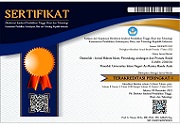ORDERS TO RECORD DEBTS (Study of Surah Albaqarah verse 282)
Abstract
The order for recording accounts payable has been stated in the Koran, this problem will also face many obstacles when dealing with a fact in the field, both in the collection and repayment of the debt, therefore it is interesting to study the extent of the opinions of the scholars of interpretation and scholars. others in determining the terms and other matters relating to the recording of accounts payable, of course this is what underlies the researcher's interest in explaining and getting a bright spot on how the scholars interpret this matter. This issue has many opinions among scholars of interpretation, both regarding the recording order and the problem of determining the criteria for witnesses in conducting debt and credit transactions. To get a deeper understanding, it is necessary to conduct a study of accounts payable, so that it can be seen how the criteria for witnesses for recording accounts payable according to the commentators and how the accounts payable according to the commentators are recorded. This study uses library research as a basic scientific perspective on interpretive scholarship, while the approach used in this research is a qualitative approach using the mauḍu'i (thematic) method. The main data sources used are the book of Tafsir al-Munīr, afwat al-Tafāsir, Tafsir al-Marāghī, the Koran and its commentary, while the supporting data sources are literature related to research titles such as books, books, dictionaries, encyclopedias, journals, as well as articles. The results of this study state that the criteria for witnesses according to the commentators in recording accounts payable, have almost the same opinion, not much different, namely Wahbah al-Zuhaili mentions that the criteria for witnesses are Islam, fulfill the obligation of prayer, have good and fair morals. And Ali al-Ṣābūnī mentions that the criteria for witnesses must be fair and firm, while al-Marāghī mentions that the criteria for witnesses must be of good religion and fair nature. The commentators have different opinions regarding the recording of accounts payable in QS. al-Baqarah: 282-283, unlike contemporary scholars who are very well known in this century, according to Wahbah al-Zuhaili the order to record accounts payable is obligatory and al-Marāghī recording debts and receivables is mandatory for avoid disputes in the future. Meanwhile, according to Ali al-Ṣābūnī, the recording of accounts payable is only a recommendation, not mandatory.
Keywords
Full Text:
PDFReferences
Abi Thayyib Muhammad Syamsul Haq al adhim abadi, ‘Ainul Ma’bud Syarh Sunan Abi Dawud, ( Darul Kutub al’imiah : Beirut : Cet.1, 1998 ) Jilid.5 : 9-10.
Abdullah bin Muhammad aṭ-Ṭayar, Ensiklopedi.
Abu Dawud pada kitab al-Buyu‘ wa al-Ijarat dengan bab fi al matl (bab ke-10), nomor hadis :3329 Juz. 3.
Ahmad Azhar Basyir, Hukum Islam, Utang-Piutang, Gadai, (Jakarta: Balai Pustaka, 2010).
Ahmad bin Ali bin Hajar Al Asqalani, Fathul Bari syarh shahih Bukhari, ( darul Kutub al “ilmiah :Beirut : Cet.2 Tahun : 1997 ) Jilid 4.
Al a’allamah Abi Thayyib Muhammad syamsul haq al “adhim abadi, Muhammad Abdul hasan Shahib , Kitb ‘Aunul Ma’bud Syarh Abu Dawud (Almaktabah Assalafiyyah di Madinah Almunawwarah, : 1969 M ) Cetakan ke – 2.
Amir Syariffudin, Garis-garis Besar Fiqh, (Jakarta: Kencana Prenada Media Group, 2010)
Departemen Pendidikan dan Kebudayaan, Kamus Besar Bahasa Indonesia, ( Jakarta: Balai Pustaka, 1998), Cet. Ke I, hlm. 689.
Ibnu Kathir, Tafsir al-‘Aẓim, Terj. Salim Bahreisy, (Surabaya: PT. Bina Ilmu, 1987).
Ibnu Majah, Sunan Ibnu Majah , Juz 3 (Beriut : Dar al-Fikr, tt), hlm. 154
Muhammad Ali al-Ṣābūnī, Ṣafwatut al-Tāfasir, (Damaskus, Darul Fikr, 2001), Juz I.
Muhammad Hasbi Ash-Shiddieqy, Al Islam 2, (Semarang : PT. Pustaka Rizki Putra, 1998), Cet. I.
Rahmat Syafe’I, Fiqih Muamalah, ( Bandung: Sinar Baru Algensindo,2013)
Sayyid Sabiq, Fiqih S, Terj. Mukhlisin Adz-Dzikri, (Surakarta: Insan Kamil, 2016), Jilid IV.
Shahih Bukhari dalam kitab al-Hawalat, pada bab fi al-hawalah wa hal Yarji‘ fi alhawalah? (bab ke-1), dan nomor : 2287, Juz. 3.
Wahbah al-Zuhaili, Fiqih Islam Wa al-Adilatuhu, Terj. Abdul Hayyle Al-Kattani (Jakarta: Gema Insani Dar Al- Fikr, 2007), Jilid V.
Wahbah al-Zuhaili, Tafsir al-Munīr, Terj. Abdul Hayyie al-Kattani, (Jakarta: Gema Insani, 2005), Cet. 8, jilid II.
Zainuddin bin Abdul Aziz Al-Malibiry, Fath Al-Mu’in 2, Terj. Abu Hiyadh (Surabaya: AlHidayah, t,th).
DOI: http://dx.doi.org/10.22373/dusturiyah.v11i2.11810
Refbacks
- There are currently no refbacks.
Copyright (c) 2021 Hajarul Akbar
All papers published in Dusturiyah: Jurnal Hukum Islam, Perundang-undangan dan Pranata Sosial are licensed under a Creative Commons Attribution-ShareAlike 4.0 International License. |
Office address: Fakultas Syariah dan Hukum Universitas Islam Negeri Ar-Raniry. Jl. Ar-Raniry, Kopelma Darussalam, Syiah Kuala, Banda Aceh, Aceh, Indonesia 23111. Email: [email protected]















